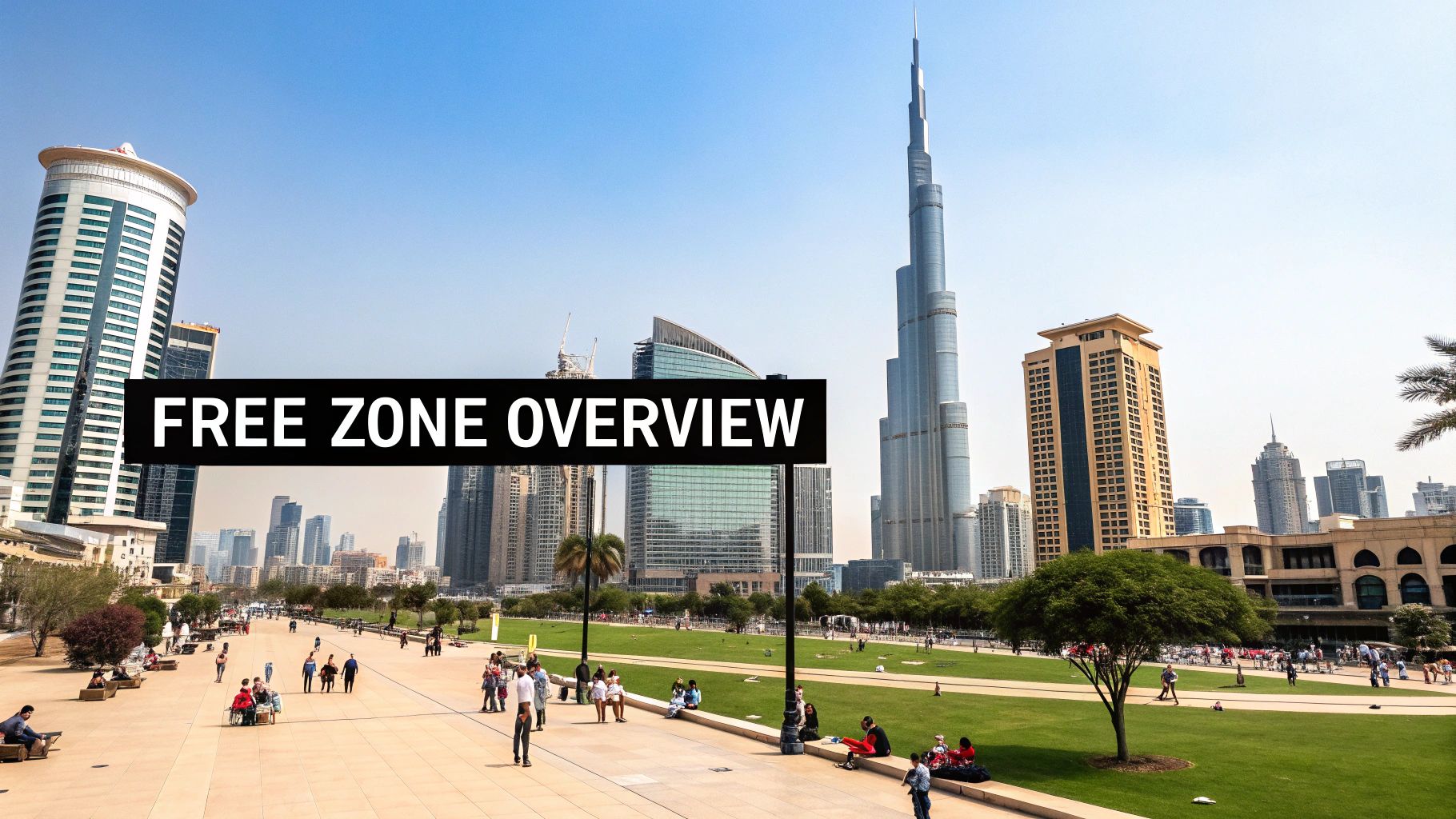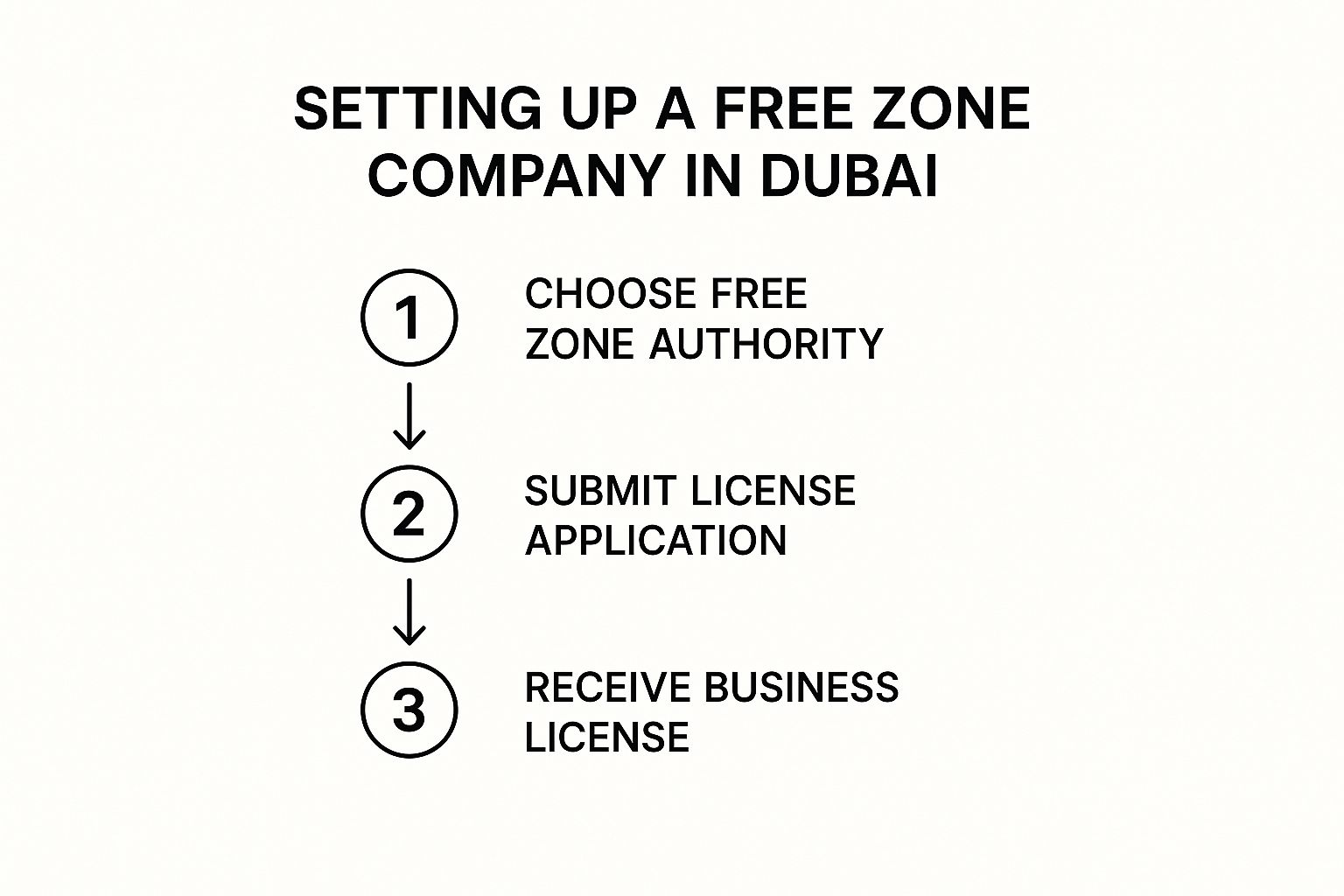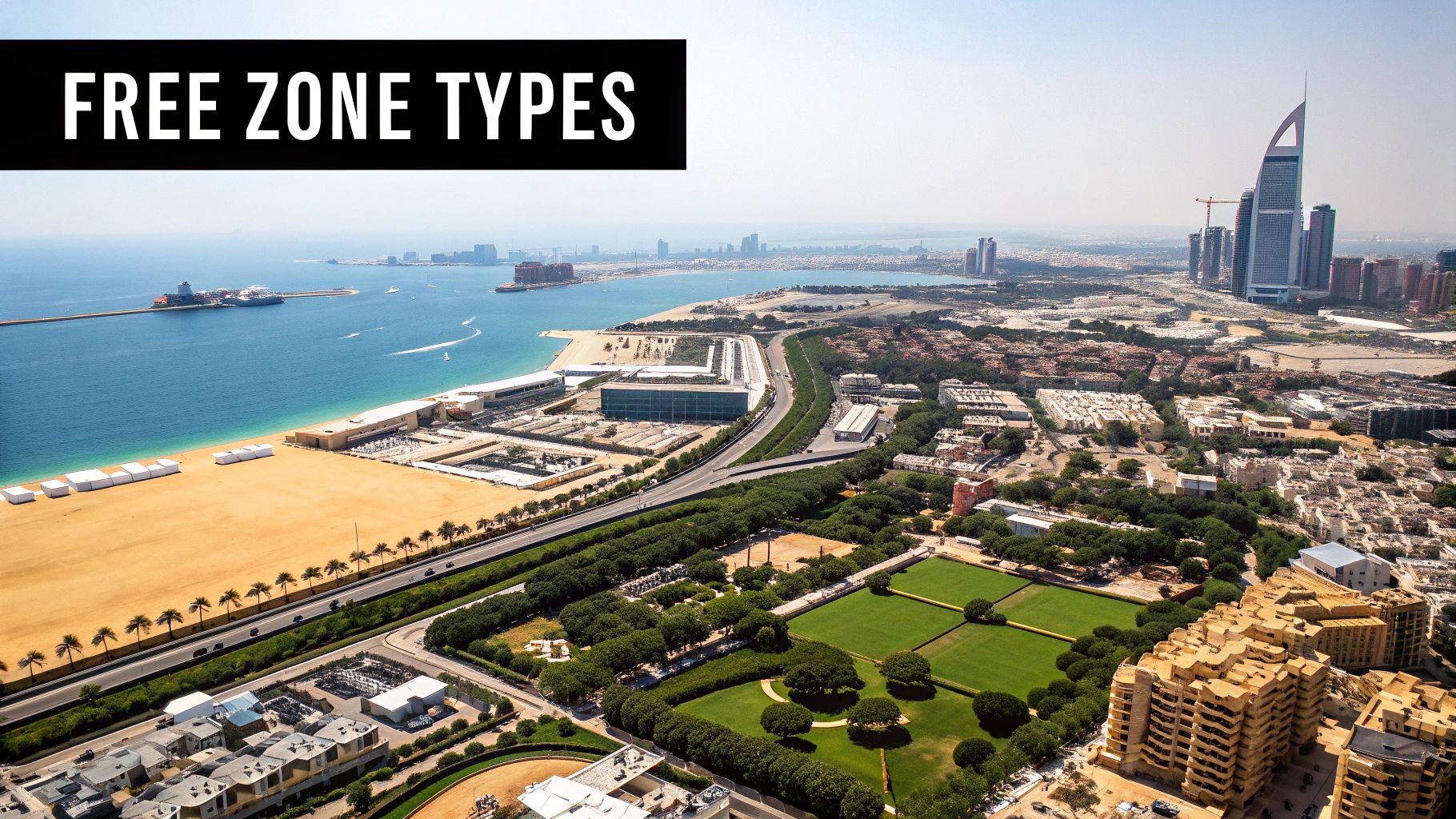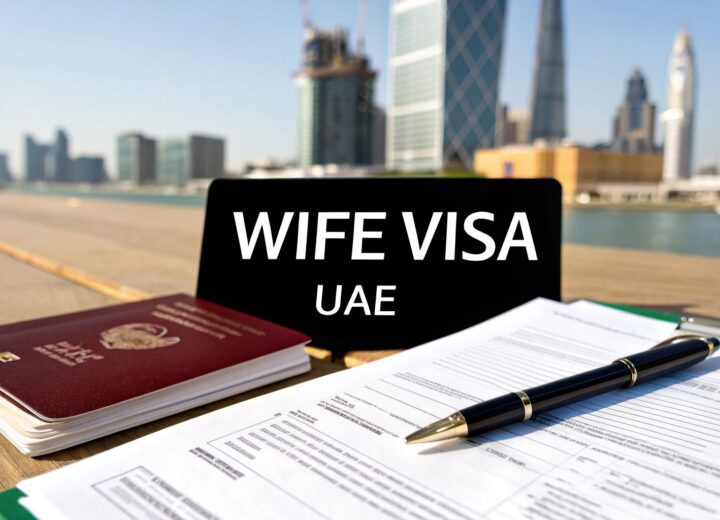Setting up your business in a Dubai free zone isn’t just a logistical step; it’s a powerful strategic decision for any international entrepreneur. We’re talking about huge advantages here, including 100% foreign ownership, zero corporate and personal income taxes, and the freedom to repatriate all your profits. This setup is specifically engineered to pull in global investment and foster a vibrant business community. It’s much more than a legal registration—it’s your launchpad for global growth.
Why a Dubai Free Zone Is Your Smartest Business Move

Deciding where to plant your company flag is one of the biggest calls you’ll make as a founder. For thousands of entrepreneurs from around the globe, the clear winner is one of Dubai’s dynamic free zones. These special economic areas are more than just dots on a map; they are meticulously planned commercial hubs built to drive global trade and innovation.
The real magic of a Dubai free zone lies in the incredible control and financial freedom it hands you. Unlike setting up on the mainland, which comes with its own set of ownership rules, a free zone gives you 100% ownership of your company. That’s right—no local sponsor or partner is needed. You have total command over your operations and can steer your business in any direction you see fit.
The Financial Edge for International Entrepreneurs
Beyond full ownership, the tax advantages are what really turn heads. Picture running your business without the weight of corporate or personal income taxes. That’s the standard in Dubai’s free zones. This incredibly tax-efficient environment means you can plow a much bigger slice of your revenue right back into your business, fueling faster growth than you could ever imagine elsewhere.
On top of that, you can repatriate 100% of your capital and profits. This gives you complete financial agility, allowing you to move money in and out of the UAE without any restrictions—a massive plus for managing cash flow across international borders. These financial perks are the core reason why a free zone setup is so popular.
Dubai’s free zones are the bedrock of the emirate’s economy, contributing roughly 30% to the UAE’s GDP. This is no accident. Dubai offers more than 40 specialized free zones, each one a hub for specific industries like technology, manufacturing, media, and consulting. This targeted approach has created powerful, self-sustaining business ecosystems.
Choosing a free zone isn’t just about finding an office. It’s a strategic move that places your business right in the middle of a globally connected, pro-business environment designed for international success.
This clustering of industries means you’re immediately surrounded by potential customers, partners, and the best talent in your sector. Whether your expertise is in tech, media, logistics, or professional services, there’s a zone purpose-built to support exactly what you do. To get a better handle on the nuts and bolts, take a look at our detailed guide on Freezone Business Setup.
To give you a clearer picture, here’s a quick rundown of what makes these zones so attractive.
Key Advantages of Dubai Free Zone Company Formation
| Benefit | Description for Entrepreneurs |
|---|---|
| 100% Foreign Ownership | You maintain complete control over your business without needing a local partner or sponsor. |
| Tax Exemptions | Enjoy 0% corporate and personal income tax, maximizing your profitability and reinvestment potential. |
| Full Repatriation of Profits | Move 100% of your capital and profits back to your home country without any restrictions. |
| Simplified Setup Process | The incorporation process is designed to be quick and straightforward, with less red tape. |
| Industry-Specific Hubs | Access a dedicated ecosystem with infrastructure and networking opportunities for your specific industry. |
| Global Connectivity | Operate from a strategic location with world-class logistics and access to international markets. |
These benefits combine to create a compelling case for basing your operations in a Dubai free zone.
Ultimately, a free zone company is your ticket to the global stage. It offers a stable, well-regarded base to operate from, tap into emerging markets, and build a truly international brand. With our cost-effective business setup solutions and 24/7 support service, we can guide you through every step and help you enjoy the UAE tax benefits for international entrepreneurs.
Choosing the Right Dubai Free Zone for Your Business

Dubai has more than 40 distinct free zones, and trying to pick the right one can feel overwhelming. It’s a classic paradox of choice. The sheer number of options is fantastic for business, but it also means there’s no single “best” answer for everyone.
The most critical factor, without a doubt, is matching the free zone’s specialty to what your business actually does. It sounds obvious, but you’d be surprised how often it’s overlooked. You wouldn’t set up a tech firm in a maritime-focused zone or a logistics company in a media hub. It’s all about finding the right ecosystem.
Think of it like this: a creative agency will thrive in a place like Dubai Media City or SHAMS because that’s where their clients, partners, and talent pool are concentrated. In contrast, a trading company needs the world-class port access that a zone like Jebel Ali Free Zone (JAFZA) provides. Getting this right from the start saves you a world of headaches later on.
Looking Beyond the Obvious Factors
Once you’ve shortlisted free zones based on your industry, it’s time to dig into the practical details that will define your day-to-day operations. A successful free zone business setup in Dubai hinges on these finer points.
Here’s what I always tell clients to look at closely:
- Geographic Location: Is it close to the airport? A major seaport? Your target customers? A logistics business might prioritize a spot in Dubai South, whereas a consultant will want a central location that’s easy for clients to get to.
- Infrastructure and Facilities: What do you physically need to operate? This could be anything from a simple co-working desk to high-tech office spaces, massive warehouses, or specialized manufacturing units. Don’t forget to check the quality of the IT infrastructure.
- Cost Structure: This is a big one. The fees can vary wildly between zones. You need to map out the total cost: license registration, annual renewals, visa quotas, and the price of your office or desk space. Some zones are known for their cost-effective packages that are perfect for startups.
- Regulatory Environment: Every free zone is its own little world with its own authority and rules. You need to understand their specific regulations on your business activities, audit requirements, and corporate governance.
These details might seem small at first, but they have a massive impact on how smoothly your business runs. As specialists in Freezone Company Formation across the UAE, a huge part of our job is helping entrepreneurs weigh these variables to find that perfect fit.
A Practical Comparison for Startups
Let’s run through a common scenario. Imagine you’re launching a new consulting firm. You need flexibility, a professional address, and a setup that won’t break the bank. You might find yourself comparing the International Free Zone Authority (IFZA) and Dubai Multi Commodities Centre (DMCC).
IFZA has built a strong reputation for its competitive pricing and incredibly fast setup process, which is a huge draw for new businesses. It offers a wide range of business activities and is very flexible with visa options—a massive advantage when you’re managing cash flow carefully in the early days.
On the other hand, DMCC is a powerhouse. It’s a huge, vibrant community known for commodities trading, but it also has a massive tech and professional services sector. The prestige of a DMCC address and the networking opportunities are undeniable, but the setup costs are typically higher. If your strategy involves landing major corporate clients right away, the initial investment in DMCC might pay off.
This kind of strategic thinking is central to any UAE business setup. We cover more of these decisions in our comprehensive guide on how to start a business in the UAE.
Choosing a free zone is less about which one is “best” and more about which one is best for you. Aligning the zone’s benefits with your specific business model, budget, and growth plans is the key to a successful launch.
To give you a clearer picture, here’s a quick look at how some of the most popular zones stack up for new businesses.
Comparing Popular Dubai Free Zones for Startups
This table breaks down some key differences to help you see which environment might be the right launchpad for your venture.
| Feature | IFZA (International Free Zone Authority) | DMCC (Dubai Multi Commodities Centre) | SHAMS (Sharjah Media City) |
|---|---|---|---|
| Primary Focus | General trading, services, and consulting with a focus on affordability and speed. | Commodities trading, but with a large and growing professional services and tech sector. | Media, creative, and e-commerce industries. |
| Setup Cost | Generally lower, making it one of the more cost-effective business setup solutions. | Higher initial investment, reflecting its premium status and extensive facilities. | Highly competitive pricing, often considered one of the most affordable options. |
| Location | Strategically located for accessibility but not within a premium central Dubai district. | Prime location in Jumeirah Lakes Towers (JLT), a major commercial and residential hub. | Located in the neighbouring emirate of Sharjah, offering a cost advantage. |
| Best For | Startups, SMEs, and entrepreneurs looking for a fast, flexible, and budget-friendly setup. | Established businesses, commodity traders, and companies seeking a prestigious address and vast network. | Media professionals, freelancers, e-commerce businesses, and creative startups. |
As you can see, each zone is tailored to a different type of entrepreneur. The right choice will serve as the foundation for your company’s growth in the UAE. By carefully weighing these factors—and maybe getting a little expert advice—you can choose a free zone that feels less like an obstacle and more like a launchpad. And with our 24/7 support service, we’re always here when you need us to help analyze your options.
Securing Your Business License Without the Headaches
Think of your business license as the official green light to operate legally in Dubai. It’s the key that unlocks your company’s potential, and getting it right is a cornerstone of your free zone business setup in Dubai. This isn’t just a piece of paper; it’s the legal foundation of your entire operation, and a smooth process here will save you a world of trouble later on.
The whole system is designed for clarity, so your first task is to get a handle on the main license categories.
Matching Your Activity to the Right License
You’ll quickly find that most free zone licenses fall into one of three buckets: Commercial, Professional, or Industrial. It’s absolutely crucial to pick the one that accurately reflects what your business actually does. A mismatch here is a classic rookie mistake that can lead to operational roadblocks or even fines.
- Commercial License: This is your go-to if you’re in the business of buying and selling goods. We’re talking import, export, and general trading. An e-commerce store shipping physical products or a distributor moving electronics would fall squarely in this category.
- Professional License: Are you selling your expertise? This license is for service-based businesses and consultants. Think IT support, marketing agencies, management coaching, or graphic design. If your value is in your skills and knowledge, the Professional license is for you.
- Industrial License: This one’s pretty straightforward. If you’re manufacturing, processing, or assembling goods—anything from packaged food to machine parts—this license provides the legal framework for your production activities.
You have to be crystal clear about your business activities on the application. The free zone authority needs to know exactly what you plan to do. Any vagueness or inaccuracy is a surefire way to get your application delayed.
Getting your business activities defined correctly from the start is critical. It’s not just a box-ticking exercise; it’s the legal foundation of your entire operation in the UAE.
This process flow diagram shows just how logical the path to securing your license really is.

As you can see, it’s a structured journey. Each step builds on the last, designed to ensure you end up with a compliant and successful company.
Preparing Your Application for a Smooth Approval
Once you’ve nailed down the right license type, it’s time to gather your documents. A complete, accurate application is the single best way to ensure a quick approval. The specifics might change slightly from one free zone to the next, but you can generally expect to need the following:
- Passport Copies: Clear, valid copies for all shareholders and the company manager.
- Business Plan: This doesn’t need to be a novel. A concise outline of your goals, activities, and who you’ll be selling to is usually enough.
- Application Form: The official form from the free zone authority, filled out meticulously.
- Trade Name Reservation: Proof that your company name has been approved.
- Memorandum of Association (MOA): The legal document detailing your company’s structure and shareholder info.
Having an expert eye review these documents before you submit can be a game-changer. As specialists in Freezone Company Formation across the UAE, we spot the little things that can cause big delays, drastically cutting the risk of rejection. We also stay on top of regulatory shifts, like Dubai’s Resolution No. 11, which now allows many free zone companies to operate on the mainland with the right permits from the Department of Economy and Tourism (DET). It’s a huge boost in flexibility.
After you submit, the free zone authority will review everything. If all your ducks are in a row, they’ll issue your business license, often within just a few working days. This is a huge milestone! With that license in hand, you’re officially a legal entity and can move on to the next exciting steps, like applying for your investor visa. You can get the full rundown in our complete guide to the UAE investor visa requirements.
Ultimately, with the right support, getting your license feels less like a headache and more like the exciting first step it’s meant to be.
A Realistic Look at Your Setup Costs and Budget

Let’s get straight to the point. The first question every entrepreneur asks is, “What’s this actually going to cost me?” It’s easy to get lost in vague online estimates, so let’s talk about real numbers for your free zone business setup in Dubai. Think of your budget as a financial roadmap—getting it right from the start is crucial for a smooth launch.
The total investment isn’t just one big fee. It’s a mix of several key expenses you need to plan for right from day one. Overlooking any of these can put a real strain on your cash flow just when you need it most.
Breaking Down the Core Expenses
So, what are you actually paying for? The best way I’ve found to approach this is to split the costs into two buckets: one-time setup fees and recurring annual costs. This simple mindset shift helps you plan for the immediate hit to your wallet and the long-term operational expenses.
Here are the main line items you absolutely need to factor in:
- One-Time Registration & License Fee: This is the big one upfront. It’s the government fee you pay the free zone authority to officially register your company and get that first trade license in hand. It varies wildly from one zone to another.
- Annual License Renewal: Your license isn’t a one-and-done deal. To stay legal and operational, you have to renew it every single year. The cost is usually pretty close to what you paid for the initial registration.
- Office Space Expenses: Every free zone business needs a registered address, no exceptions. Your options run the gamut from a budget-friendly flexi-desk to a fully furnished private office. What you choose here will have a major impact on both your setup cost and your annual overhead.
- Visa Costs: This covers your own investor visa plus any visas for your employees. The fees include the application, medical tests, and the Emirates ID card. The more people on your team, the higher this part of your budget will be.
As specialists in Freezone Company Formation across the UAE, we always tell our clients to map these costs out in a simple spreadsheet for their top two or three free zone choices. Having the numbers laid out in black and white makes the final decision so much easier.
A Real-World Budget Scenario
Let’s make this tangible. Imagine you’re a team of two launching a digital marketing consultancy. You need a professional setup but are keen to keep initial costs down. Here’s what a sample budget might look like.
Case Study: Two-Person Digital Marketing Consultancy
- Objective: Establish a lean, professional presence with two visas.
- Strategy: Pick a cost-effective free zone and go for a flexi-desk to minimize office expenses.
| Cost Component | Estimated Amount (AED) | Notes |
|---|---|---|
| Trade License & Registration | AED 12,000 | A one-time fee for a professional services license in a competitive zone. |
| Establishment Card Fee | AED 2,000 | This is a mandatory, one-time fee for the company’s immigration file. |
| Flexi-Desk Package | AED 8,000 | An annual cost that covers your legal address and gives you workspace access. |
| Investor/Employee Visas (x2) | AED 10,000 | Covers everything for two people (approx. AED 5,000 each). |
| Total Estimated Initial Cost | AED 32,000 | Your approximate upfront investment to get the doors open. |
As you can see, a free zone business setup in Dubai can be surprisingly accessible. The total initial outlay in this scenario is around AED 32,000—a manageable figure for many new ventures.
Smart Tips for Managing Your Setup Budget
You have more control over your costs than you might think. Many free zones are actively courting international entrepreneurs with some incredible benefits. The 100% ownership allowance and complete exemption from corporate and personal income taxes are massive financial wins right out of the gate.
Some zones are known for being particularly wallet-friendly. For example, Sharjah Media City (SHAMS) has packages with initial setup costs starting as low as AED 5,750.
Your budget isn’t just about paying fees; it’s about making strategic choices. Opting for a bundled package or a flexi-desk can dramatically reduce your upfront capital requirement, freeing up funds for marketing and operations.
Once you’re up and running, smart financial management is all about diligent tracking. It’s a good idea to research effective strategies for tracking business expenses to keep your finances clear and healthy. This kind of discipline is vital for long-term success. With our expertise in creating cost-effective business setup solutions tailored to your needs, we can help you build a realistic budget that aligns perfectly with your goals, ensuring a financially sound start in the UAE.
Your Essential Post-Setup Checklist for a Strong Start
https://www.youtube.com/embed/pAQFIPDHvFE
Getting that trade license in your hands is a huge milestone for your free zone business setup in Dubai, but think of it as the starting pistol, not the finish line. What you do next is what actually turns that piece of paper into a real, functioning business. It’s easy to get bogged down in the details at this stage, but a clear game plan makes all the difference.
First things first: open your corporate bank account. This isn’t optional—it’s the backbone of your business operations in the UAE and a must-have for professional financial management. Banks here are diligent with their compliance checks, so expect them to ask for the full suite of your new company documents: trade license, memorandum of association, shareholder passports, the works.
Get ready for a deep dive. The bank needs to understand your business model, who your clients will be, and your expected transaction volumes. Having every document perfectly organized from the get-go will make this approval process much smoother.
Securing Residency and Building Your Team
Once the company is officially a legal entity, the natural next step is sorting out residency visas for yourself and any employees you’re bringing on board. The whole process kicks off with applying for your company’s establishment card. Think of this as the key that unlocks your ability to apply for entry permits for your team.
After an entry permit is issued, the person needs to either enter the UAE or, if they’re already here, do an “in-country status change.” From there, it’s a few final hurdles:
- A medical fitness test: This is standard and involves a blood test and a chest X-ray.
- Biometrics for the Emirates ID: A required step for every resident.
- The residence visa stamp: The final piece of the puzzle, placed right in your passport to make your residency official.
This is a multi-step journey where having a pro in your corner really helps. Our specialists in Corporate PRO Services and Attestation Services are built for this. We handle the paperwork, deal with the government departments, and keep things moving so you can stay focused on building your business.
Navigating Tax and Compliance Obligations
Getting a handle on your financial responsibilities right from the start is absolutely critical for long-term health. The UAE’s tax benefits are a major draw, but that doesn’t mean there’s no paperwork.
Don’t mistake a low-tax environment for a no-compliance environment. Staying on top of your financial duties is key to keeping your company in good standing and avoiding any nasty surprises or penalties down the road.
There are two main taxes you need to get straight on:
- Value Added Tax (VAT): You must register for VAT with the Federal Tax Authority (FTA) if you expect your annual turnover to hit the mandatory threshold of AED 375,000.
- Corporate Tax: Yes, there’s a 0% tax rate on taxable income up to AED 375,000, but that doesn’t get you out of your administrative duties. You are still required to register your company with the FTA and file your returns.
Keeping track of these registrations and filings takes real attention to detail. This is another spot where our specialists can step in, making sure you’re fully compliant without the headache.
Finally, with all the administrative groundwork laid, it’s time to shift your focus to growth. For your new free zone company to really take off, you need clients. Check out these effective lead generation strategies to help land those crucial first customers. From getting your Investor Visa or Golden Visa to making sense of tax law, our team is here with 24/7 support to guide you through it all.
Taking the Headache Out of Your Business Setup
Trying to figure out the business setup process on your own can feel like wading through mud. That’s where we come in. We specialize in making your free zone business setup in Dubai a smooth, straightforward experience.
✅ Specialists in Mainland Company Formation in Dubai, Sharjah & Abu Dhabi
✅ Specialists in Freezone Company Formation across the UAE
✅ Specialists in Golden Visa on Property and Investor Visa
✅ Specialists in Corporate PRO Services and Attestation Services
✅ 24/7 Support Service – Always here when you need us
✅ Cost-Effective Business Setup Solutions tailored to your needs
✅ Enjoy UAE Tax Benefits for International Entrepreneurs
We offer 24/7 support because we know that big questions and bright ideas don’t just happen between 9 and 5. Let us manage the red tape so you can get back to what matters: growing your business and taking full advantage of the UAE’s incredible tax benefits.
Ready to get started?
📞 Call Us Now: +971-54-4710034
💬 WhatsApp Us Today for a Free Consultation: Start a Chat
Common Questions About Dubai Free Zone Setup
Starting a business in a Dubai free zone is an exciting move, but it almost always comes with a flood of questions. Getting the right answers from the start is what separates a smooth launch from a frustrating one. Let’s walk through some of the most common queries we get from entrepreneurs looking to make their mark in the UAE.
This isn’t about reciting legal code. It’s about giving you practical, real-world insights so you can see the bigger picture.
Can My Free Zone Company Do Business on the Mainland?
This is probably the first question everyone asks, and for good reason. The short answer is: not directly, but there are ways. A free zone license is primarily built for operating within that zone’s boundaries and for international trade. If you want to sell products or services directly to customers on the Dubai mainland, the classic route is to work with a local distributor.
But things are changing. Some free zones and business activities now have pathways to get special permits from the Department of Economy and Tourism (DET). This can open up the mainland market for you. It’s not a one-size-fits-all solution, though—it really depends on what your business does. Getting the right advice here is crucial to see what’s possible for your specific setup.
What’s the Real Difference Between a Free Zone and a Mainland Company?
When you strip it all down, the choice comes down to two key things: ownership and where you can do business.
- Ownership: This is the big one. A free zone company gives you 100% foreign ownership. You have full control, no local partner needed. For many mainland companies, you’ll still need a Local Service Agent, especially for professional services.
- Business Scope: Free zone companies are powerhouses for international trade but are restricted from working directly within the local UAE market. Mainland companies have the freedom to operate anywhere in the UAE and can even bid on lucrative government projects.
Your target customer should be your guide. If you’re focused on global or regional clients, a free zone is a fantastic, streamlined option. If your goal is to serve the local Dubai or UAE market, then a mainland setup makes more sense.
Choosing between a free zone and the mainland isn’t just a legal checkbox. It’s a fundamental business decision that shapes who you can sell to and how you’ll operate.
How Long Does It Actually Take to Get Set Up?
The timeline for a free zone business setup in Dubai can move surprisingly fast, but it depends heavily on the free zone you choose and how buttoned-up your paperwork is. Many authorities have streamlined their process so well that you could have your license in hand within a few working days. Others might take a couple of weeks.
But getting the license is just the first major step. You still have to sort out your visa and, critically, open a corporate bank account, which has its own timeline. The single best way to keep things moving is to make sure your application is perfect from the get-go. Small mistakes can cause big delays.
At PRO Deskk, we’ve helped countless entrepreneurs navigate this process, turning confusion into clarity. From picking the perfect free zone to handling all the little details after you’re incorporated, our job is to make your entry into the UAE market as smooth as possible.
📞 Call Us Now: +971-54-4710034
💬 WhatsApp Us Today for a Free Consultation or learn more at https://prodesk.ae.





